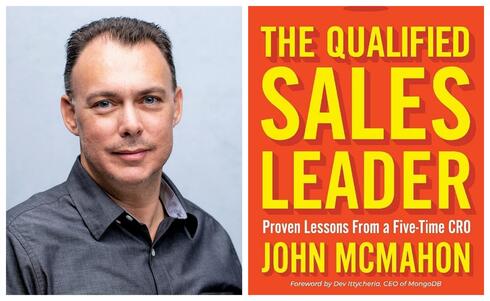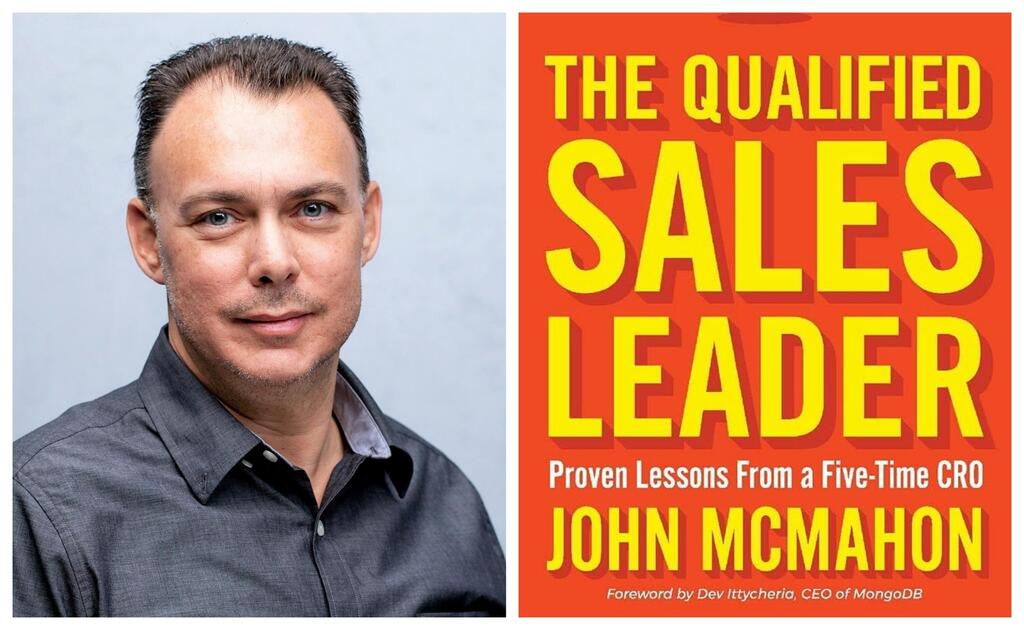
BiblioTech
CTech’s Book Review: The guide to stellar sales
Ami Aharonovich, VP, GM at Aerospike Israel, has joined CTech to share a review of “The Qualified Sales Leader” by John McMahon.
Ami Aharonovich is the VP, GM at Aerospike Israel, a real-time, high-performance NoSQL database. He has joined CTech to share a review of “The Qualified Sales Leader” by John McMahon
Title: “The Qualified Sales Leader”
Author: John McMahon
Format: Book
Where: Home
Summary:
‘The Qualified Sales Leader’ by John McMahon is a hands-on guide for sales leaders, based on McMahon’s experience as a five-time CRO. He breaks down what really works when managing complex sales, from understanding what drives the buyer to handling company politics. McMahon emphasizes the importance of mentoring your sales team, improving forecasting, and building a culture where accountability thrives. His advice feels like you’re learning from a seasoned mentor who’s seen it all and knows what it takes to succeed in the real world of high-pressure sales. It’s an essential read for anyone serious about leading sales teams.
Important themes:
McMahon brings a fresh and grounded approach to sales leadership, especially for those dealing with complex B2B environments. One of the standout themes is McMahon's deep dive into understanding buyer motivations. He stresses that successful sales go beyond meeting surface needs—you have to uncover what truly drives the decision-makers, especially when navigating large organizations with layers of approval and internal politics.
McMahon also puts a strong emphasis on coaching, not just managing. He makes the case that sales leaders shouldn’t just focus on closing deals but on mentoring their teams, fostering accountability, and developing long-term skills. This resonates well in fast-evolving industries like tech, where building up talent is just as important as hitting targets.
What’s particularly refreshing is his take on forecasting. He challenges leaders to move away from relying on gut instincts and instead adopt a data-driven, disciplined approach. This isn’t just about better forecasting; it’s about leading with more precision, which is critical when deals involve multiple stakeholders and long sales cycles.
McMahon also emphasizes creating a culture of transparency and accountability, which can make all the difference when you’re working with teams spread across different departments. He provides actionable insights on how to foster meaningful conversations that help drive deals forward with more clarity and control.
In essence, McMahon’s book stands out because it’s not just about hitting numbers—it’s about leading with insight, mentoring teams, and driving sustainable success in a complex sales world.
What I’ve learned:
What I’ve learned from ‘The Qualified Sales Leader’ really boils down to three key takeaways that are immediately relevant to the way I approach sales leadership.
First, McMahon’s emphasis on deeply understanding the buyer’s motivation hit home. In my experience, it’s easy to focus on the technical aspects of a deal, but what truly moves the needle is understanding what’s happening internally on the buyer’s side. McMahon pushes you to go beyond surface-level needs and dig into the emotional and organizational drivers. That’s something I’ve seen play out with many of the large tech companies we work with—success comes when you can anticipate internal dynamics.
Second, his focus on mentoring is a wake-up call. I’ve always understood the importance of developing the team, but McMahon’s approach is about more than just coaching—it’s about instilling accountability and guiding people to think critically for themselves. He reframes the role of a sales leader as not just a closer, but a builder of future leaders, and that’s powerful in an industry where talent development is as crucial as the product itself.
Finally, McMahon’s take on data-driven forecasting is something I can immediately apply. In a world where deals are increasingly complex, relying on intuition isn’t enough. He makes a compelling case for process discipline and leveraging data to make more accurate, predictable forecasts. This aligns with the way we manage our pipeline and can be a game-changer for closing bigger, more strategic deals with clarity and consistency.
Overall, McMahon’s insights sharpened my perspective on how I can lead more effectively.
Critiques:
While the book offers valuable insights, it does have some limitations. McMahon's advice leans heavily on experience in large, well-established organizations, which may not fully resonate with startups or smaller businesses where agility and rapid decision-making are key. The book also focuses primarily on sales leadership in high-ticket, enterprise-level deals, leaving out strategies for handling smaller, transactional sales that many companies still rely on.
Another critique is that McMahon assumes a high level of sales maturity from the reader, which might make the book less accessible for those earlier in their careers or new to leadership roles. Additionally, while the emphasis on data-driven forecasting is insightful, the book could have provided more actionable tools or frameworks for implementing these strategies in day-to-day operations, particularly for teams without robust data analytics systems in place.
Who should read this book:
Sales leaders, especially those in enterprise-level or complex B2B environments, should read ‘The Qualified Sales Leader’. The book is ideal for experienced professionals looking to elevate their leadership skills and drive more predictable, high-stakes sales.














